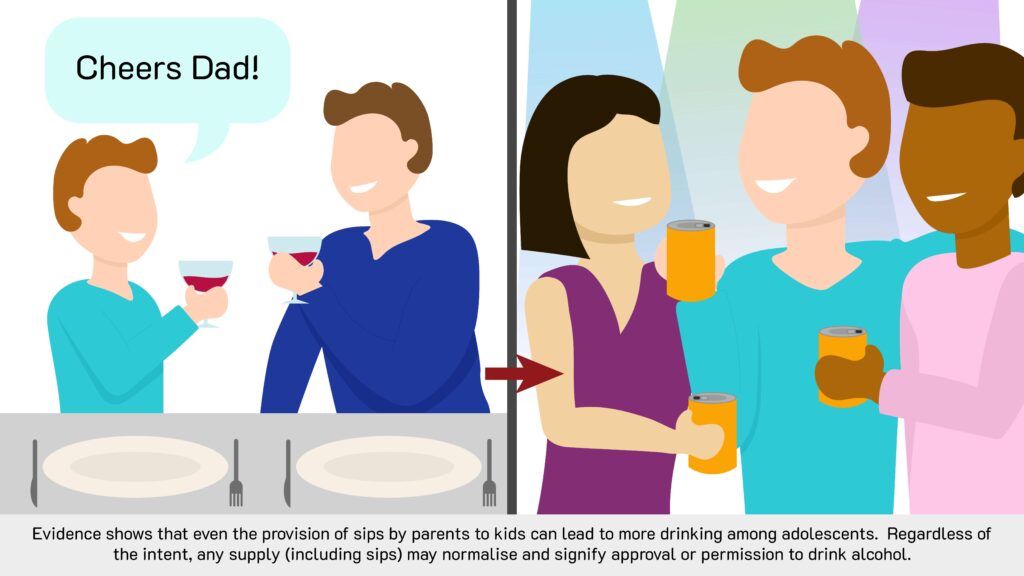Experts are warning parents to think twice before supplying alcohol to underage children and to be mindful of their own drinking patterns in front of their kids.
"Parents commonly believe that introducing their kids to alcohol in a 'controlled' way, such as a small glass of wine at Sunday lunch, will de-mystify alcohol and promote a responsible attitude towards drinking.

"Unfortunately research shows that supplying alcohol to underage kids can lead to an earlier onset of risky drinking behaviours and have negative health consequences," says Professor Jacqueline Bowden from the College of Medicine and Public Health.
"It is clear from medical evidence that allowing underage kids to drink, and supplying them with alcohol, even under the supervision of a parent, is not recommended.
"We now know that any amount of alcohol can harm young developing brains, negatively impact hormone activity, and can lead to a range of health complications, mental health conditions, antisocial behaviour and risky sexual behaviour.
"How parents behave around alcohol and how they address the subject can have a huge impact on their kids," she says.
The legal age to purchase alcohol in Australia is 18 years or older however 'secondary supply' is a term to describe an adult providing alcohol to someone under the age of 18.
Secondary supply is the most common way that young people obtain alcohol, with 47% of 12- to 17-year-old drinkers getting alcohol from their parent.
Professor Bowden and her research team have been awarded more than $945,000 from the Medical Research Future Fund (MRFF) to work with parents and adolescents to develop ways in which to help inform them about the impact and dangers of supplying alcohol.
The research project will enlist the aid of parents and their teenagers to design and test communication materials, such as videos for social media, or television and online information, to support parents and discourage them from providing alcohol to their children.
"Data shows that parents are supplying drinks to their teenagers in the mistaken belief that it is building a responsible relationship with alcohol. Unfortunately, the evidence shows that, on the contrary, it can increase drinking and the associated harms among young people," she says.
"Parents have a right to know all the facts and be aware of all the risks, so they can make an informed decision. We want to develop resources that build trust, transparency and confidence between parents and their kids when addressing this tricky topic," says Professor Bowden.
Flinders University Deputy Vice-Chancellor (Research) Professor Raymond Chan congratulated all the researchers and their teams on securing funding from the Medical Future Fund towards projects that will improve the health and wellbeing of Australians.
"We are fortunate to have a team of exceptionally talented researchers and their groundbreaking research is making a significant impact by tackling some of the most intricate healthcare issues affecting individuals today."
Professor Bowden says there are some simple but powerful steps that every parent can take to help steer their kids away from alcohol.
Limit availability of alcohol
Many parents believe supplying their children with alcohol in the safe environment of their home teaches them to drink responsibly.
Unfortunately, parental supply - whether deliberate or if teenagers drink their parent's supply behind their back - is associated with heavier teen drinking both inside and outside of the family home.
Evidence shows that even the provision of sips by parents to kids can lead to more drinking among adolescents. Regardless of the intent, any supply (including sips) may normalise and signify approval or permission to drink alcohol.
- Set boundaries and clear expectations
Alcohol is the leading individual risk factor for death and disability in 15-24-year-olds globally.
Parents have an important role to play in protecting teenagers, setting boundaries and clear expectations about drinking alcohol.
Talk to your teens about the risks of consuming alcohol. If they are attending parties where there is likely to be alcohol, let them know your expectations and teach them they can say no.
Talk to other parents about their rules and what your stance is on alcohol.
- Be a good role model
Parents are important role models for kids when it comes to alcohol. We suggest that parents are mindful of their own drinking in front of children. It's important not to glamourise the use of alcohol or make it a focal point. It's also not a good idea to ask children to pour adults alcoholic drinks.
Children are incredibly perceptive and seeing their parents tipsy or drunk can leave them feeling anxious at unusual behaviour, but it can also influence their own future drinking habits

Acknowledgements: The project, 'The power of parents: co-designing health communications to reduce adolescent drinking' starts in early 2024 and is funded by Medical Research Future Fund (MRFF) The Australian Government's Medical Research Future Fund (MRFF) provides grants of financial assistance to support health and medical research and innovation, with the objective of improving the health and wellbeing of Australians.
For support or advice contact the National Alcohol and Other Drug Hotline: 1800 250 015






